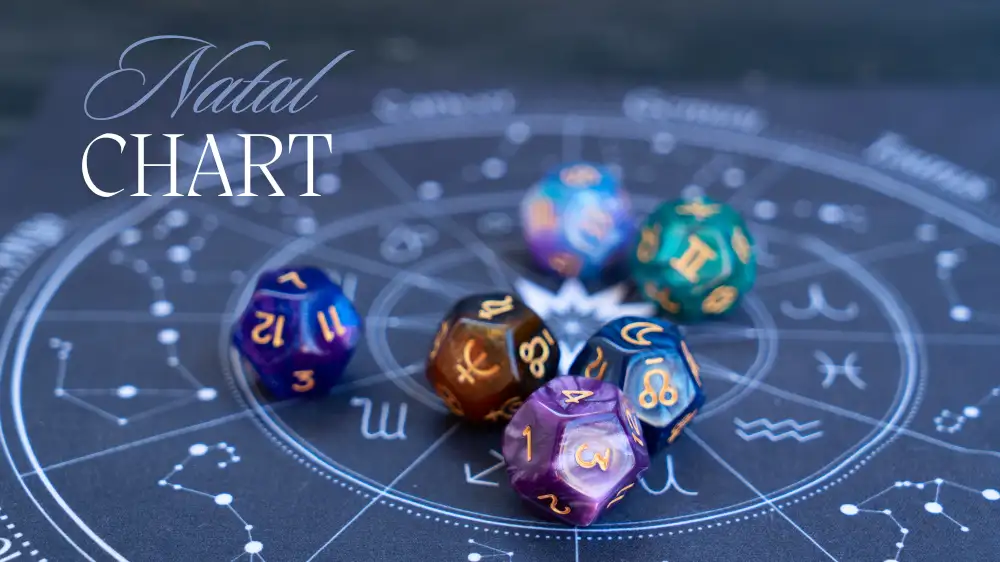Do you want to learn how to accurately predict events using a birth chart? In this article, we will discuss seven key steps to help you read a birth chart.
[toc]
Step 1. Identify the Important House
Each house of the birth chart represents a specific area of life. For example:
- 2nd house — finances and property;
- 12th house — exile and hidden enemies;
- 10th house — career and success.
Let’s say we are interested in a person’s professional life in this chart, so we focus on the 10th house.
Step 2. Find the Planets Related to the House
An astrological house influences the planets, focusing their actions on a specific area of life. For example, the Sun by itself (outside a house) shows:
- leaders, bosses, and men among people;
- recognition among social interactions;
- gold among metals;
- lions among animals;
- the heart among organs, and so on.
However, the house that the Sun falls into will determine or determine which of its meanings will manifest in a particular area of life.
For example:
- The Sun in the 4th house of parents will show the man and leader of the family, i.e., your father;
- The Sun in the 12th house of illness will indicate heart diseases, as it rules the heart;
- The Sun in the 11th house of friends will indicate high-ranking allies;
- The Sun in the 10th house of career will show the person’s success in their career.
Even if the Sun is not in a house, it can still influence it through the sign of Leo. The reason is that the zodiac signs emit the energies of the planet that rules them, and the Sun rules Leo. Therefore, if the sign of Leo is on the cusp of the 10th house of career, the 10th house will begin to focus the reflected rays of the Sun on career matters. This will lead to fame and recognition, as the Sun represents these qualities. This connection with the house is called "rulership."
In our example, the 10th house contains several planets — the Sun, Mercury, Mars, and Venus. And the house itself is ruled by Jupiter.
[promoFreeCourse]
Step 3. Identify the Major Planets
Choose the key planets whose rays are most focused on the chosen area of life. First, consider the planets whose natural meanings match the meaning of the house. The house particularly easily focuses the influence of such planets on the corresponding objects. In our case, there are two such planets — the Sun and Jupiter:
- The Sun represents recognition, and the 10th house also represents recognition;
- Jupiter represents a high social position, and the 10th house also represents a person's social position in society.
- Other planets do not share meanings with the 10th house.
Next, consider the planet in the house that is closest to the cusp. And that’s again the Sun.
Thus, the Sun and Jupiter are the key planets that determine the activities in this birth chart.
Step 4. Assess the Condition of These Planets
A planet either brings benefits or causes problems, depending on the sign it is in:
- In compatible signs, the planet has a favorable effect on the house matters.
- In incompatible signs, it brings destruction.
In our case, both planets, the Sun and Jupiter, are in neutral states. However, since both planets are favorable by nature, they create good results in the career, though not as easily as if they were in fully compatible signs.
Step 5. Explore Connections With Other Houses
Analyze the signs the major planets are in and who rules those signs. The sign's ruler will indicate the circumstances under which the planet will manifest.
Example With the Sun
The Sun is in Pisces, which is ruled by Jupiter. The Sun (fame and success in career) will manifest in areas governed by Jupiter:
- Jupiter itself represents religion, science, law, and high positions;
- The 9th house focuses these qualities on religion, science, or long travels.
At the intersection of these meanings, Jupiter will indicate either religion or science. Therefore, the person will gain fame and success either in religion or in science.
On the other hand, inside the 10th house, there is Mercury, which naturally signifies science and trade but not religion. Taken together, the planets incline the person toward science rather than religion.
Thus, we see that the native will be known for their scientific work.
Example With Jupiter
Jupiter is in Aquarius, ruled by Saturn. This means that Jupiter (the native’s scientific activity) will manifest against the background of what Saturn represents.
Saturn naturally signifies illness, exile, deprivation, and death. The 9th house focuses these qualities on religion, science, or distant countries. Being sick in science or an emigrant in religion is an illogical intersection of meanings. The only logical meaning for Saturn here is forced stay in other countries, emigration due to exile.
This interpretation is supported by independent indications:
- Saturn is in a sign of incompatible nature, meaning it is particularly destructive;
- It is conjunct with Mercury, the ruler of the 12th house of exile and persecution;
- On the cusp of the 10th house, there is the star Fomalhaut, which is also associated with the legend of persecution and miraculous rescue.
We have three additional independent indications that the scientific activity will take place against the backdrop of exile, persecution, and emigration.
[promoFreeCourse]
Step 6. Identify the Year of significant Events
Now, move on to determining the year of the event. Use primary directions for this.
For example:
- The Sun promises fame and success;
- Jupiter promises a surge in scientific activity;
- Saturn promises problems in activities due to persecution and forced emigration.
So, if we direct Jupiter, promising a surge in scientific activity, toward the Sun — the significator of great fame and recognition, we will find the year and approximate month when the native will make a discovery that brings them fame. This direction points to September 1907.
You can also direct not only the planet itself but its specific aspect. Saturn has several specific aspects (or facets), one of which is especially connected to exile. This is the sextile at 4° Gemini, right on the cusp of the house of exile and persecution. If we direct this specific aspect of Saturn to the ruler of the 12th house of persecution, we get February 1933.
Thus, we easily find that the native is a scientist who will be persecuted and forced to emigrate and that in 1933, they will be exiled from the country due to their work, and in 1907, they will make a discovery that brings them fame.
This was Albert Einstein’s birth chart. Indeed, in 1907, he formulated the postulates of the general theory of relativity, which brought him worldwide fame and recognition in physics. In 1933, Nazi Germany declared his works illegal, and a bounty was placed on his head. Einstein was forced to emigrate to the USA, where he spent the rest of his life.
Step 7. Determine the Exact Month and Day of the Event
This step requires a high level of expertise in forecasting using the birth chart, which we discuss in detail in the second part of our predictive astrology course. However, to give you a general understanding, I will briefly describe it here. If you wish to dive into the details, I recommend watching the video where I show the entire process of analyzing a birth chart to the exact day.
Watch an example of a real prediction.
- At this step, you create a solar return chart to confirm that the event will indeed occur in the year you identified in the previous step.
- Then, you move the primary directions from the solar return chart to highlight a short period (2-4 days) when the event may occur.
- After that, you create a lunar return chart covering those dates. Your task is to find confirmation of the event in the lunar chart.
- Then, you create directions from the lunar return chart, which narrows the time frame to 1-2 days.
- Finally, by using the transit chart, you pinpoint the exact date of the event.
Using this approach for other houses, you can find events in any area of life — from financial changes to marriage or childbirth. The stars do not influence us constantly; rather, they create several key events in our lives, and at other times, we act according to our own will. It is very important to know when these events will occur so you can be prepared to protect yourself from unpleasant surprises or, on the other hand, take advantage of a lucky opportunity.
Remember: astrology is a predictive discipline that helps forecast significant events so you can better control your life.
What to Focus On When Reading a Natal Chart?
Shared Meanings of Planets and Houses
It is crucial to identify the common ground between the meaning of a planet and the house it rules or occupies. For example, let’s analyze the chart below:
According to its natural meaning, Jupiter governs religion, foreigners, jurisprudence, high-ranking positions, wealth, and expensive items. In this chart, Jupiter is in Capricorn, under the rulership of Saturn, which governs the 2nd house of money and possessions. There is a logical connection between Jupiter and the 2nd house — money and expensive items. Thus, being in the 1st house (symbolizing a person’s character), Jupiter inclines a person toward costly purchases.
The State of the Planet
The natural ruler of wealth: In this example, Jupiter, although symbolizing wealth, is in a debilitated state — in its fall. This means that, relative to the 2nd house of money, it is more likely to cause financial losses rather than gains.
Ruler of the house of money: The ruler of the 2nd house, Saturn, naturally signifies limitations. In the financial context, it points to the need for saving and the absence of easy income. In this chart, Saturn lacks dignity, making it incapable of generating significant wealth through its nature, such as saving.
[promoFreeCourse]
Interposing Planet
Pay attention to the planet that intervenes in the same area of life in multiple ways. In this example:
- Jupiter is tied to Mars through mutual reception (Jupiter is in Mars' exaltation, and Mars is in Jupiter's domicile). This indicates a mutual connection between Mars and Jupiter (a planet that inclines toward expensive purchases but causes financial losses).
- Saturn (the ruler of the 2nd house of money) is also under the influence of Mars.
- Additionally, Mars itself rules the 2nd house by exaltation.
As you can see, Mars is connected to the 2nd house in three ways, so it intervenes in the 2nd house matters. Identifying a planet that affects a specific area of life is similar to finding a third planet, interposing the question discussed in the first part of our predictive astrology course.
What does Mars produce concerning the 2nd house? Lacking dignity in this chart, it expresses its malefic nature, causing significant money loss. These could include theft, investment losses, spending on expensive purchases, or forced expenses to support loved ones. Below, we'll explore precisely what Mars is connected to in this chart.
Common Themes Between Multiple Planets
Pay attention to the shared meanings that multiple planets have concerning a single area of life. In this example:
Jupiter-Mars:
- Jupiter inclines toward expensive purchases while simultaneously causing financial losses (due to its debilitated state). Being ruled by Mars, it expresses itself through Mars, leading to the depletion of savings during costly purchases.
- Mars indicates financial loss due to personal actions (as it is located in the 1st house and lacks dignity). However, under Jupiter's rulership, it manifests as a loss of money on the backdrop of expensive purchases.
The common theme between Mars and Jupiter is sudden expenses on costly purchases that deplete savings. These expenses are not forced but originate from the individual (as Mars and Jupiter are both in the 1st house). This same pattern repeats with Saturn, the ruler of the 2nd house.
Saturn-Mars:
- Saturn represents financial restrictions and the necessity to save money by its nature. However, being devoid of dignity, it cannot facilitate savings.
- Saturn expresses itself through Mars—spending (as it is under Mars' rulership).
The common theme between Saturn and Mars is constant saving with no ability to accumulate wealth due to expenditures.
Mars-Venus:
Additionally, note the aspect of Mars at 18° Libra. This aspect is destructive, as it falls in Mars' place of exile. In the context of the 2nd house, this aspect foretells expenditures. What are these expenditures connected to? The spending (18° Libra) is tied to Venus (19° Libra), which:
- Represents luxury;
- Rules the 5th house (the house of luxury);
- Simultaneously resides in its domicile, signifying expensive items.
Thus, we see the same scenario for the third time—sudden expenditures linked to purchasing costly items.
How the person described the situation:
"I know how to save and consistently set money aside. But then I spend my savings on large purchases—a down payment for a car, a summer house, an apartment. Periodically, I empty my savings and start saving again."
This example vividly illustrates how planets express themselves at the intersection of their meanings. The skill of an astrologer lies in the ability to logically synthesize various indicators in a natal chart, identifying shared themes at the intersection of their significations.
We specifically teach This logical synthesis skill in the first part of our predictive astrology course.


